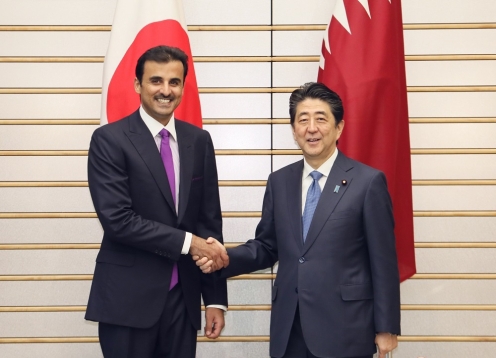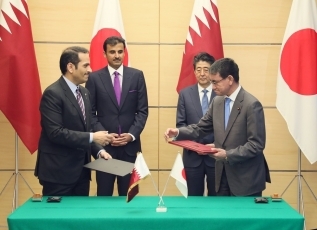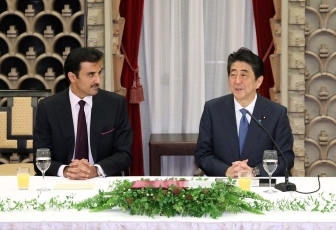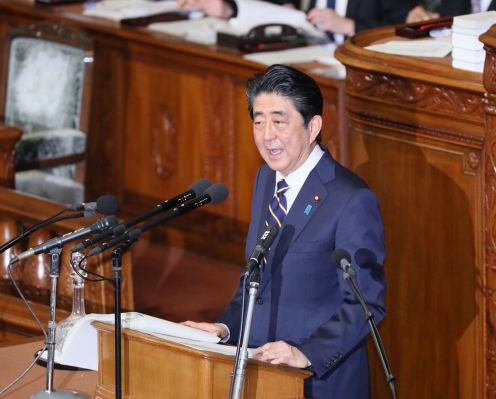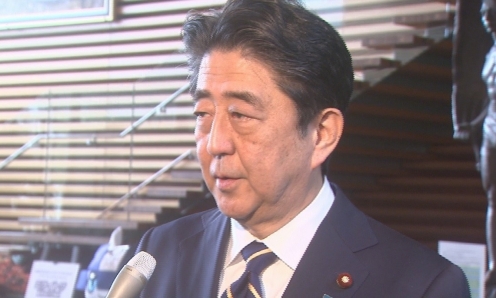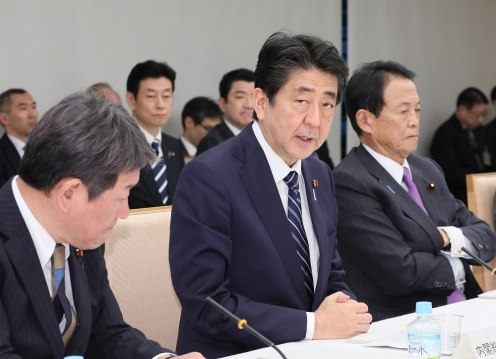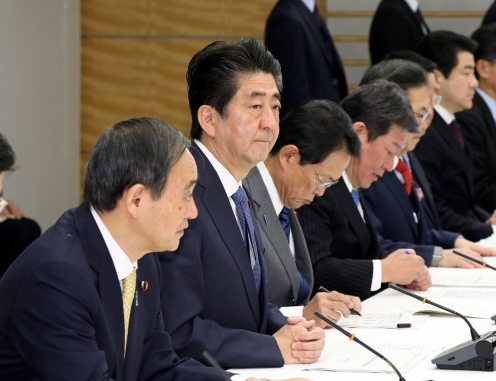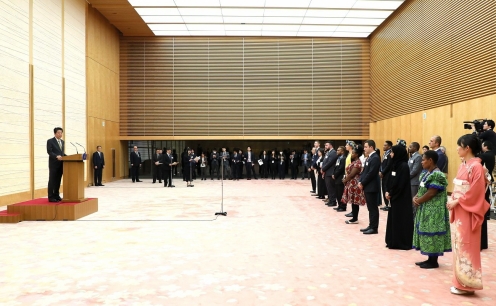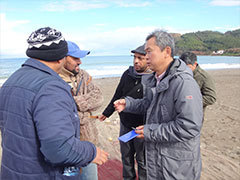Japan-Qatar Summit Meeting and Other Events
Cabinet Secretariat, Tuesday, January 29, 2019
[Provisional Translation]
On January 29, 2019, Prime Minister Shinzo Abe held a summit meeting and other events with H.H. Sheikh Tamim Bin Hamad Al-Thani, Amir of the State of Qatar, at the Prime Minister’s Office.
Following the salute and guard of honor ceremony, the two leaders held a summit meeting and attended a signing ceremony afterwards.
Lastly, the Prime Minister hosted a banquet at the Prime Minister’s Official Residence and said in his address,
“Once again, I wholeheartedly welcome H.H. Sheikh Tamim Bin Hamad Al-Thani, Amir of the State of Qatar, on his first visit to Japan in four years.
The two of us just held very meaningful discussions at our meeting. I hope that His Highness will relax and enjoy Japanese cuisine tonight. The AFC (Asian Football Confederation) Asian Cup is currently taking place in the United Arab Emirates (UAE). Both the Japanese and Qatari national teams are demonstrating solid performances in their matches. I hope Qatar wins tonight’s match and plays against Japan in the final.
Next year, the Tokyo Olympic and Paralympic Games will be held in Japan. The following year, 2021, will mark the 50th anniversary of the establishment of diplomatic relations between Japan and Qatar. In 2022, the FIFA (International Federation of Association Football) World Cup will be held in Qatar. I anticipate that the Japanese national team will be playing, so I would like to ask you to cheer for them.
I would like to further enhance our diverse and extensive relationship, not limited to energy, as well as deepen the friendship between the people of the two countries through culture and sports.
At today’s banquet, we are joined by leaders who support the friendly bilateral relationship in a variety of fields, including politics, the economy, and culture. It is thanks to you that we enjoy the Japan-Qatar relationship we have today. I would like to take this opportunity to express my gratitude to our distinguished guests and ask for your continued support.
I would like to close my remarks by once again welcoming His Highness the Amir and his delegation to Japan wholeheartedly and wishing for your health and happiness as well as for the further deepening of the Japan-Qatar relationship. Thank you very much.”
Japan-Qatar Summit Meeting
Foreign Affairs, Tuesday, January 29, 2019
On January 29, commencing at 3:50 p.m. for approximately 45 minutes, Mr. Shinzo Abe, Prime Minister of Japan, held a meeting with H. H. Sheikh Tamim Bin Hamad Al-Thani, Amir of the State of Qatar during his official working visit to Japan. The overview is as follows. After the meeting, Prime Minister Abe and Amir Tamim attended the signing of the Joint Declaration on the Establishment of a Strategic Dialogue and the memorandum of cooperation.
1. At the beginning, Prime Minister Abe welcomed Amir Tamim’s first visit to Japan in four years and expressed gratitude for the many efforts by Amir Tamim and other Qatar Government officials for the release of the Japanese journalist detained in Syria. He also welcomed that 2021 will be the 50th anniversary of the establishment of diplomatic relations between Japan and Qatar, and stated that he hoped it would be an opportunity to promote cooperative cultural exchanges and appeal for good bilateral relations.
2. Amir Tamim stated that Japan and Qatar’s relations are seen in not only energy, but also various fields, and that he would like to deepen bilateral relations through the 2020 Tokyo Olympic and Paralympic Games and the 2022 FIFA World Cup in Qatar, and that he expects that friendly bilateral relations will be strengthened in various fields.
3. Both leaders welcomed the establishment of the Strategic Dialogue, and confirmed to the existing Joint Economic Committee, Policy Dialogue, and Security Dialogue framework by utilizing further strengthening bilateral cooperative relations. In addition, Prime Minister Abe stated that the Government of Japan decided to relax issuance requirements for multiple entry visas for Qatari citizens toward activating people-to-people exchanges.
4. Both leaders confirmed the importance of bilateral cooperative relations for LNG. In addition, they indicated their hopes for the development of private business cooperation while welcoming the participation of Japanese businesses in infrastructure projects, including for energy, transportation, and power generation, through utilization of Japan’s strong advanced technology.
5. In addition, both leaders exchanged views on the international situation in the Middle East, Asia, and other regions.
Japan-Qatar Banquet at the Prime Minister’s residence
Foreign Affairs, Tuesday, January 29, 2019
On January 29, commencing at 6:45 p.m. for approximately 70 minutes, Mr. Shinzo Abe, Prime Minister of Japan, held a dinner with H. H. Sheikh Tamim Bin Hamad Al-Thani, Amir of the State of Qatar during his official working visit to Japan, following their summit meeting as well as their attendance at the signing of the Joint Declaration on the Establishment of a Strategic Dialogue and the memorandum of cooperation. The overview is as follows.
1. At the beginning, Prime Minister Abe wholeheartedly welcomed H.H. Sheikh Tamim’s first visit to Japan in four years again. He also stated that currently the teams from Japan and Qatar are competing in the AFC Asia Cup in the United Arab Emirates and that he hoped the Qatari team would compete with the Japanese team in the final. He also stated that next year the Tokyo Olympic and Paralympic Games would be held in Japan, that 2021 would be the 50th anniversary of the establishment of diplomatic relations between Japan and Qatar, and that the FIFA World Cup will be held in Qatar in 2022, and that together with the citizens of both countries deepening their friendly relations through culture and sports, he would like to further deepen richer, thicker relations that are not limited to energy.
2. H.H. Sheikh Tamim stated his gratitude for the warm welcome, stated that at the earlier summit meeting it was agreed to strengthen bilateral cooperation in various fields, that Japan is Qatar’s top trade partner and that he would like to further strengthen this strategic connection. He also stated his congratulations for the Japanese team’s advancement to the final at the AFC Asia Cup, and said that he looked forward to the team competing with Japan in the final.
3. The dinner was held in a very harmonious atmosphere.
Policy Speech by Prime Minister Shinzo Abe to the 198th Session of the Diet
Cabinet Secretariat, Monday, January 28, 2019
[Provisional Translation]
On January 28, 2019, Prime Minister Shinzo Abe delivered a policy speech to the 198th Session of the Diet during the plenary sessions of the House of Representatives and the House of Councillors.
Press Conference on the 198th Ordinary Session of the Diet
Cabinet Secretariat, Monday, January 28, 2019
[Provisional Translation]
On January 28, 2019, Prime Minister Shinzo Abe held a press conference at the Prime Minister’s Office.
Regarding the 198th ordinary session of the Diet, the Prime Minister said,
“This will be the last session of the Diet in the Heisei era. This session of the Diet will also mark the start of a new era. We will endeavor to fulfil the expectations of the people, aiming to achieve the swift passage of the budget and the passage of a series of important bills, including those for making education free.”
Foreign Policy Speech by Foreign Minister Kono to the 198th Session of the Diet
Foreign Affairs, Monday, January 28, 2019
At the 198th session of the Diet, allow me to outline Japan's foreign policy. This is my second foreign policy speech. The six pillars that I explained in my foreign policy speech last year will continue to be the centerpiece of Japan's foreign policy.
First, in order to ensure the peace and security of Japan, we will further fortify the Japan-U.S. relations and enhance the deterrence and response capabilities of the Japan-U.S. Alliance. We will also do our utmost to mitigate the impact of U.S. forces on local communities through measures such as the relocation of Corps Air Station Futenma to Henoko as soon as possible. At the same time, we will promote support for internationalization, which will lead to further growth of Okinawa. Moreover, we will promote English language education with the support of the United States.
In addition, we will enhance cooperation with countries which share common values, including freedom, democracy, basic human rights, the rule of law and respect for international laws. We will promote the networking of allies and partners through frameworks of cooperation with countries sharing strategic interests, including India, Australia, the EU and major European countries, as well as through frameworks of regional cooperation in the Asia-Pacific region, including ASEAN.
Second, we will enhance relationships with neighboring countries while taking into consideration the security environment around Japan.
Regarding the relationship with Russia, following the agreement between the two leaders to accelerate the negotiations on a peace treaty on the basis of the 1956 Joint Declaration of Japan and the USSR, I will persistently negotiate with Russia as the person responsible for the negotiations based on our basic policy of resolving the territorial issue and concluding a peace treaty.
It is extremely important for Japan to build a stable relationship with China from a broad perspective. We will not only strengthen the two countries' economic relationship but also deepen people-to-people exchange and strengthen the relationship of trust through high-level exchange including visits between our leaders. Meanwhile, any unilateral attempts to change the status quo in the East China Sea can never be accepted. Japan will continue to take a calm and resolute approach to the situation.
The international community will never accept nuclear-armed North Korea. We will show the current North Korea regime that North Korea is well-placed to shape a brighter future for itself if it resolves the nuclear and missile issues and takes the right path. We will maintain international solidarity among the international community until the complete, verifiable and irreversible dismantlement of all weapons of mass destruction and ballistic missiles by North Korea and continue efforts toward the early resolution of the abductions issue.
As for the relationship with the Republic of Korea (ROK), Japan will strongly demand the ROK to firmly honor its international commitments, including the Agreement on the Settlement of Problems concerning Property and Claims and on Economic Co-operation between Japan and the Republic of Korea and the Japan-ROK agreement concerning the issue of comfort women. In addition, with regard to Takeshima, which is an inherent part of the territory of Japan, Japan will firmly convey its position to the ROK and make persevering efforts.
Third, Japan will firmly uphold the rules-based multilateral trading system centered on the World Trade Organization (WTO) and act as a standard-bearer of reform efforts. Japan will also vigorously conduct economic diplomacy, including such activities as: supporting Japanese companies' overseas expansion through joint efforts by the public and private sectors; promoting resource diplomacy, including the utilization of renewable energy; promoting in-bound tourism; taking countermeasures against reputational damage to products produced in Japan; taking countermeasures against overseas cases of infringement of intellectual property owned by Japanese companies; and making sustainable use of living resources, including whales. This year, Japan will host the G20 summit and exert leadership in promoting global economic growth as the G20 presidency.
Fourth, Japan will make more active contributions than before to the resolution of global issues.
The United Nations Security Council no longer reflects the realities of the 21st century. Reforming the Security Council is an urgent matter not only for Japan but also for the international community. As a first step, we aim to start formal negotiations toward the reform.
For Japan, the only country to have ever suffered atomic bombings during war, nuclear disarmament and non-proliferation is an important issue. In order to realize a world free of nuclear weapons, Japan will play the leading role in concrete and practical measures for nuclear disarmament and non-proliferation by building a bridge between countries with different positions, such as between nuclear-weapon States and non-nuclear-weapon States, through maintaining and strengthening the Treaty on the Non-Proliferation of Nuclear Weapons (NPT) and holding meetings of the Group of Eminent Persons for Substantive Advancement of Nuclear Disarmament.
At a time when it has become an urgent task to deal with global issues, we will promote activities to realize a society in which "no one will be left behind" based on the concept of "human security," which has been advocated under Japan's leadership toward achieving the sustainable development goals (SDGs).
Climate change is one of the most important issues. As the impact of climate change extends all the way, even to the Arctic region, it is important to examine the mechanisms of environmental changes and understand their impacts. Japan will firmly take actions to deal with the impacts of climate change, including steadily implementing the Paris Agreement, taking advantage of its own knowledge and technology.
In addition, Japan will implement measures to reduce marine plastic litter and to promote Universal Health Coverage (UHC). Looking ahead to the G20 Osaka Summit, Japan will exert leadership in addressing these issues.
Although the areas controlled by ISIL in Iraq and Syria have shrunk considerably, the threat of terrorism and violent extremism has spread worldwide, including in Asia, due to the return of foreign terrorist fighters to their home countries and their relocation to third countries. Japan will enhance cooperation with relevant countries with respect to counter-terrorism measures and promote moderation. We will also make every possible effort to ensure the safety of Japanese nationals abroad.
Fifth, we will continue to enhance our policy towards the Middle East. Peace and stability in the Middle East is directly linked to the peace and economic prosperity of the world, including Japan. Therefore, Japan needs to strengthen its political involvement in the Middle East. From religious and ethnic viewpoints, Japan maintains a neutral position and Japan has not left any negative footprint in the history of the Middle East. Moreover, Japan has a strong alliance with the United States, which has significant influence in the Middle East. Japan has its original role exactly because of these advantages. Japan has come to be recognized as one of the significant players in the Middle East and Japan will play a further active role in order to promote peace and stability in the Middle East under the "Kono Four Principles"-"intellectual and human contribution," "investment in people," "enduring efforts" and "enhancing political efforts"-which indicates Japan's basic principle when dealing with the Middle East.
Sixth, we will continue efforts to realize a "free and open Indo-Pacific." The free and open maritime order based on the rule of law and the safety of sea lanes constitute a cornerstone for stability and prosperity of the international community. Therefore, we will closely cooperate with related countries including ASEAN countries, the United States, Australia, India and New Zealand, in taking concrete actions to ensure that the freedom of navigation and the rule of law spread and take root, to enhance connectivity through the development of quality infrastructure in accordance with international standards, and to provide capacity building assistance in the field of maritime security.
This time, in addition to the matters I already mentioned, I would like to offer my thoughts on several other issues.
Japan will never conduct diplomacy backed by military power. On the other hand, the amount of official development assistance (ODA), which is a major pillar of Japan's diplomacy, has declined to around half of the peak level. We have entered an era when Japan's diplomatic capabilities based on wisdom and idea are tested. To enhance those true and raw diplomatic capabilities, it is essential to strengthen the foundation of diplomatic activities. To that end, the Ministry of Foreign Affairs must attract and recruit talents and develop their skills. At the Ministry of Foreign Affairs, women account for around 30% of all staff and around half of new recruits for next fiscal year. In addition, around 60% of all staff, equivalent to around 3,500 people, work at diplomatic missions abroad. Staff in various circumstances, including those whose spouses have jobs and those whose family members need nursing care, are active in their workplaces. However, as the workload at the Ministry of Foreign Affairs is growing dramatically, overtime working hours for some staff are at a very serious level, as I stated on several occasions. If this situation continues, it may become difficult for the ministry to attract talents. Therefore, it is necessary to make further efforts to develop systems that enable each staff member to regularly spend time with his/her families and use paid leave for childcare or for other purposes and holidays to devote himself/herself to childcare and nursing care, thereby achieving a sustainable family-work balance. I would like to seek the understanding of the members of the legislative branch on this situation. Furthermore, in order to ensure diversity at the ministry, we also strive to develop an environment that enables people with disability to work actively by doing our utmost to promote recruiting of people with disability.
Of course, I have grave responsibilities to fulfill as the Foreign Minister. It is essential to conduct top-level lobbying to win international support for Japan concerning matters such as the United Nations Security Council non-permanent membership election, the election of judges of the International Court of Justice, the full implementation of United Nations Security Council resolutions related to North Korea, and the reform of the United Nations. Many international meetings are increasingly becoming occasions where various national interests to clash, in order to have Japan's positions reflected in the international discussions, it is essential to cooperate and coordinate with other countries before and after the meetings. Since I took office as Foreign Minister, I have visited 63 countries and regions, including nine countries which no Japanese Foreign Minister had ever visited, amounting to 94 trips to foreign countries and regions in total. With the spirit of "no country shall be left behind," I will continue to dedicate myself whole-heartedly to performing my duties as Foreign Minister. To that end, it is necessary to improve the efficiency of official overseas visits by the Foreign Minister and simplify relevant logistical procedures.
Washoku (Japanese food), which was inscribed on the list of intangible cultural heritage of the United Nations Educational, Scientific and Cultural Organization (UNESCO) in 2013, is now emerging as a major diplomatic advantage for Japan. Indeed, in many countries, presidents and prime ministers eagerly visit Japanese ambassadors' official residents to enjoy washoku. To further promote this trend, it is important to continue to have good cooks in place at the official residences.
The greatest diplomatic task for Japan is to continue to defend the international order based on fundamental values such as freedom, democracy, basic human rights, the rule of law and respect for international laws, against challenges from various quarters.
I believe that if a country achieves economic development, its people will begin to seek democracy as the next step. However, steps towards democratization are lagging behind in comparison with economic development around the world. We must firmly fight against attempts to create an order that challenges the international order based on fundamental values.
On the other hand, if a country aims to democratize, there are various paths that can be followed. I am sure that the ideal path and pace of democratization differ from country to country. Japan aims to support the democratization that suits the circumstances of each country, rather than trying to impose democracy. At the G7 Summit and other international forums, Japan will make sure to speak on behalf of Asian countries aiming for democratization at their own pace under the international order based on fundamental values.
Recent years have also shown trends by some countries controlling and censoring activities in cyberspace. In defense against excessive control and censorship, Japan safeguards a "free, fair and secure cyberspace" based on an international multi-stakeholder initiative that encourages wide participation from the private sector, the academic world and civic society. Also, while the development of technologies such as AI, IoT, and 5G is creating new services and social values, it is making our society increasingly vulnerable to cyberattacks. As it is not easy for any one country to deal with these threats alone, cooperation with the whole international society is essential. In recognition of this situation, Japan promotes cyber diplomacy based on three pillars-"promotion of the rule of law," "development of confidence-building measures," and "cooperation on capacity building"-in order to realize a "free, fair and secure cyberspace."
International debate has started on Lethal Autonomous Weapon Systems, known as LAWS, which are equipped with artificial intelligence and which can kill or wound people without human control. Just as gunpowder or nuclear weapons changed the way of conducting was in the past, artificial intelligence could fundamentally change the way of conducting war. While there is the risk that an artificial intelligence system could kill people based its own judgement without human control, as was the case in the movie "The Terminator," the use of artificial intelligence could make it possible to replace soldiers at low cost. Many countries have already entered the race to develop weapons equipped with artificial intelligence. For its part, Japan will be actively involved in the development of international rules while taking into consideration the viewpoint of its national security based on its position that meaningful human control is essential.
With respect to ODA, Japan aims to provide it in a manner matching its focus on human security without trying to achieve what is beyond its capacity.
In order to deepen understanding on ODA among the Japanese people, it is necessary to make clear its effects. Regarding assistance related to health, education, empowerment of women and agriculture, it is becoming easier internationally to express the effects in numerical terms. Given the use of taxpayers' money, a commitment to the results is essential with respect to ODA as well.
This year, the Seventh Tokyo International Conference on African Development (TICAD 7) will be held in Yokohama. In Africa, there remain countries where the level of public trust in national institutions related to elections, parliament, the legislation, the judiciary, public order, taxation, and immigration control is low, with emphasis placed on ethnic, cultural and religious bonds, rather than on governance systems. This situation sows the seeds of frequent civil wars, religious conflicts, and acts of terrorism and delays the development of the countries. Japan will actively extend support for activities to promote peace building, particularly the development of national institutions, in Africa. On the other hand, Africa, a continent achieving remarkable growth, is called the last frontier of the 21st century and has huge potential. Toward TICAD7, we will further promote trade and investment between Japan and Africa through the public and private partnership, human resource development for the sake of Africa's economic growth, and the development of quality infrastructure.
The global number of refugees and displaced persons in the world has reached around 70 million people, the highest level since the end of World War II. Because of the impact of climate change, natural disasters including typhoons and torrential rains are expected to be more severe than before. In order to achieve the SDGs by 2030, an estimated 2.5 trillion dollars is needed annually to cover the funding gap. However, Japan and many other developed countries are facing severe fiscal constraints. Therefore, we need to develop an innovative financing mechanism. Those who have benefited from globalization should contribute part of the benefits to international organizations for humanitarian assistance. It is worth debating in-depth on the idea of creating an international financing mechanism that uses some of the benefits brought by globalization to resolve global issues while taking account of the progress in international initiatives. Japan will be leading these debates.
Under the rules set by the Development Assistance Committee (DAC) of the Organisation for Economic Co-operation and Development (OECD), countries whose gross national income (GNI) per capita exceeds the threshold will be excluded from the counting of ODA. However, at a time when disaster risks are growing in island countries and amid the ongoing climate change, flexible action is essential. Japan will firmly support people in need of assistance regardless of its eligibility as ODA.
Many developing economies are seeking not only ODA but also investments from Japan. Given the limited size of the ODA budget, promoting private-sector investments is also very important for the future of Japan's diplomacy. We will provide firm support for overseas business expansion through the provision of information and the use of ODA so that small and medium-sized enterprises, as well as large enterprises, can actively expand abroad.
Japan will not only promote major free trade initiatives, such as the expansion of the Comprehensive and Progressive Agreement for Trans-Pacific Partnership (TPP11) , which entered into force at the end of last year, the implementation of the Japan-EU Economic Partnership Agreement (EPA), which will also enter into force, and the early conclusion of the Regional Comprehensive Economic Partnership (RCEP) negotiations, but will also strategically advance free trade agreements (FTAs) and investment treaties with small-sized economies. The number of countries and cities to which direct flights from Tokyo are available is small compared with the numbers of countries and cities that can be directly reached from Beijing and Seoul. In order to take advantage of the energy of the private sector for the benefit of Japan's diplomacy, the Ministry of Foreign Affairs must cooperate with the Ministry of Land, Infrastructure, Transport and Tourism to raise the number of direct flights and increase international exchange in terms of investment and tourism.
Across the world, there are an increasing number of young people who have become interested in Japanese language and culture, with Japanese manga and anime acting as a gateway. Doraemon, Hello Kitty and Pikachu have now become world-known characters, while sushi and ramen restaurants are springing up around the world. We need to continue communicating Japanese culture to the world in various forms, including not only manga and anime but also TV programs, movies, music, food, drinks and games. Unfortunately, Japan has a cultural budget smaller than that of the ROK, not to mention France, so Japan should make increased efforts in this respect. On the other hand, there are limits to what can be achieved through the government's budget alone. It is also important to consider ways so that cultural projects can be commercially sustainable while promoting cooperation between the public and private sectors.
Japan's nature and culture are attracting many foreign tourists. In the runup to the Rugby World Cup 2019, the Olympic and Paralympic games Tokyo 2020, and the EXPO 2025 Osaka, Kansai, Japan, we will contribute to the promotion of in-bound tourism, actively communicating to the international community that regions hit by natural disasters have been recovering.
We will make increased efforts to communicate Japan's policies and initiatives in a strategic manner internationally so that Japan can implement various foreign policy initiatives and realize an international order based on fundamental values. In particular, it is extremely important to communicate Japan's position concerning the understanding of history and territorial integrity.
It is also extremely important to take actions to increase people who have a good understanding of Japan and support the country. Japanese language training is important for smoothly accepting foreign workers and realizing a society in which Japanese and other people can live together harmoniously. This viewpoint will also be incorporated in our future efforts in the field of Japanese language training. However, unfortunately, the Japanese language is lagging far behind other languages, such as French, Spanish and Chinese, not to mention English, in terms of the number of learners. We must make patient efforts. Collaboration with communities of Japanese immigrants and descendants is also important. It is essential to further enhance initiatives to strengthen the bond with communities of Japanese immigrants and descendants.
Diplomacy is not something conducted only by the Ministry of Foreign Affairs and the government. It is necessary to conduct diplomacy in a way that takes full advantage of the whole of Japan's resources and capabilities. We must make more active use of the strengths of non-governmental organizations (NGOs) in providing grant aid and technical assistance. Actually, we must support NGOs that can be utilized for that purpose. To do so, we will first increase Japan's NGO-related budget by around 30% in consideration of a recommendation submitted by a panel of experts concerning ODA. We will gradually increase the budget further while watching the budget implementation. In particular, we will consider the possibility of increasing the general administration expenditure budget for NGOs by a maximum of 15%.
We will establish governance at the Japan International Cooperation Agency (JICA) and will also nurture implementing agencies that can compete with JICA with respect to the implementation of ODA. We will consider the characteristics of implementing agencies, including NGOs and development consulting firms, and implement ODA in a visible, whole-of-Japan approach, while maintaining sound competitive relationships between the implementing agencies. We will strengthen international competitiveness by carrying out fundamental reform in the field of consulting as well.
It is also an urgent task to increase the number of Japanese nationals working at the United Nations and other international organizations. Although we have made it clear to international organizations that Japan would like to increase the number of Japanese staff members and senior personnel to a level commensurate with its financial contributions, the number of Japanese applicants for posts at those organizations is insufficient in the first place. Few young people pass the United Nations' employment screening exams due to insufficient English skills and the like, so employment through the Junior Professional Officer (JPO) program is about the only path to a post at United Nations organizations. As a result, the number of young Japanese people who are employed by United Nations organizations is constrained by the size of the JPO budget. As a short-term solution, we will give Japanese students studying abroad better guidance regarding international organizations. We will resume dispatching national public employees to international organizations as JPOs.
In order to support the appointment of Japanese personnel to senior posts at international organizations, we will make use of posts at the Ministry of Foreign Affairs to assist Japanese personnel at international organizations aiming for higher posts.
Japanese higher education has not necessarily been succeeding in enabling students to acquire a good command of English. This is an obstacle for Japanese people not only in working at international organizations but also in making active contributions on various occasions. The issue here is not the choice between speaking proper Japanese or English. We need both. It is an urgent task to fundamentally reform our English learning systems. We will cooperate with the Ministry of Education, Culture, Sports, Science and Technology.
In order to secure top posts at important international organizations, other countries field former prime ministers, cabinet members and other politicians as candidates. If Japan is to win these posts Japan must do the same. To that end, it is essential to choose a right person at the right place regardless of the ruling parties or the opposition parties. We welcome any Diet members to step forward to take on the challenge. The Ministry of Foreign Affairs will provide full support.
We are resolved to continue to contribute to the peace and stability of the world while firmly defending Japan's national interests and peace.
I ask for the understanding and cooperation of all Diet members and the people of Japan.
Meeting of the Council on Economic and Fiscal Policy
Cabinet Secretariat, Wednesday, January 30, 2019
[Provisional Translation]
On January 30, 2019, Prime Minister Shinzo Abe held the second meeting of the Council on Economic and Fiscal Policy in 2019, at the Prime Minister’s Office.
At the meeting, intensive discussion was held on monetary policy, commodity prices, and other issues, followed by a discussion on medium-to-long term economic and fiscal management.
Based on the discussion, the Prime Minister said,
“Today, we first held intensive discussion on monetary policy, commodity prices, and other issues. It is expected that the Japanese economy will continue to recover at a moderate pace as the employment and income situation is still improving. Meanwhile, we need to be mindful of world economic risks. I would like to ask Minister of State for Economic and Fiscal Policy Motegi to take all possible measures for macroeconomic management, further expand the virtuous cycle of growth and distribution, and exert every effort to further ensure that the economic recovery remains firmly on track.
In addition, we discussed medium-to-long term economic and fiscal management after the report from the Cabinet Office regarding the results of the economic and fiscal projections for medium to long term analysis. As was proposed by our experts, it is important to increase productivity while encouraging investment in capital and labor, and strengthen the growth potential of the economy. I ask that the Council discuss this point further.
The Abe Cabinet gives the highest priority to the economy. Taking the opportunity of the Rugby World Cup this year and the Tokyo Olympic and Paralympic Games next year, we will continue to advance steadily towards the largest nominal GDP in postwar history of 600 trillion yen.”
Ministerial Council on the Monthly Economic Report and Other Relative Issues
Cabinet Secretariat, Tuesday, January 29, 2019
[Provisional Translation]
On January 29, 2019, Prime Minister Shinzo Abe attended a meeting of the Ministerial Council on the Monthly Economic Report and Other Relative Issues at the Prime Minister’s Office.
Regarding the assessment of the current state of the Japanese economy, the January Monthly Economic Report states, “The Japanese economy is recovering at a moderate pace.” Furthermore, concerning short-term prospects, the Report states, “The economy is expected to continue recovering, supported by the effects of the policies, while employment and income situation is improving. However, attention should be given to the risks including the effects of situations over trade issues on the world economy, the uncertainty in overseas economies including the prospect of Chinese economy and the effects of fluctuations in the financial and capital markets.”
Courtesy Call from Representatives of Youth Participating in the “Ship for World Youth Program ~MEIJI 150th~” Project
Cabinet Secretariat, Friday, January 25, 2019
[Provisional Translation]
On January 25, 2019, Prime Minister Shinzo Abe received a courtesy call at the Prime Minister’s Office from representatives of youth participating in the “Ship for World Youth Program ~MEIJI 150th~” project.
The Prime Minister said in his address,
“I would like to offer my heartfelt welcome to all of you who visit Japan so as to attend the Ship for World Youth project. I appreciate the remarks from the representative on behalf of the participants from various countries
Since assuming the office as the Prime Minister, I have met with leaders from all over the world, in Japan and overseas. In particular, in Darwin where you will stop over, I held a very meaningful meeting with the Hon. Scott Morrison, Prime Minister of the Commonwealth of Australia, during my visit there just last November.
I was told that you each play active roles in governments, international organizations, and NGOs with various capacities. You are all expected to become future leaders in your respective organizations. I hope that all of you will discuss what true leadership should be and learn from one another, making use of this opportunity.
I believe that the time that you spend together with your colleagues on the sea, isolated from the outside world, and the bonds that you form there, will become extremely valuable assets to all of you as you become a leader in your designated countries in the future. I hope that you will all cherish this experience, your friends, and this network.
We are now facing various global-scale problems and each county has its own challenges to face. I have high hope that you will utilize what you learn from this program and leverage the network you are cultivating through this program as you work to solve those issues. Thank you very much.”
Summary of Opinions at the Monetary Policy Meeting on January 22 and 23, 2019
Bank of Japan, Thursday, January 31, 2019
Summary of Opinions at the Monetary Policy Meeting on January 22 and 23, 2019
I. Opinions on Economic and Financial Developments
Economic Developments
* Japan's economy is expanding moderately, with a virtuous cycle from income to spending operating. Going forward, it is likely to continue expanding, mainly against the background of highly accommodative financial conditions and the underpinnings through government spending.
* Japan's economy is expanding moderately. Through fiscal 2020, the economy is likely to continue growing at about the same pace as its potential. While the countermeasures for the scheduled consumption tax hike are likely to contribute to maintaining the uptrend in domestic demand, it is necessary to pay attention to downside risks to overseas economies, which have been heightening somewhat.
* Japan's economy has continued to expand moderately and firms' fixed investment stance has not particularly changed. On the other hand, downside risks to the global economy have been heightening. Specifically, the growth pace of the Chinese economy has started to decelerate, due in part to the effects of the trade friction, and it is necessary to pay close attention to developments in the economy, including in stimulus measures.
* The effects on Japan's economy of factors such as the trade friction between the United States and China are likely to be limited so far, although some people point to a decrease in orders from China.
* Amid the heightening uncertainties concerning the global economy and the scheduled consumption tax hike in Japan, consumption of nondurable goods has not moved off its bottom. It also is concerning that indicators of consumer sentiment have weakened somewhat.
* Although hard data suggest that the trend in Japan's economy has been firm, it also is true that some market participants hold excessively pessimistic views. Risks to overseas economies have been increasingly tilted to the downside, along with heightening uncertainties, and there are concerns that some of them may materialize. In that case, fiscal and monetary policies in each economy will be important but it could take some time for the policy effects to emerge.
* While stock prices tend to reflect changes in the real economy in an amplified manner, the recent fall in stock prices to a certain extent indicates the anticipation of a global decline in the real economic growth rate. The background to this is the stagnation of the economy in China, which now has the world's second largest import market. This is clear from developments in exports and imports, rather than GDP, which is declining marginally.
* As the baseline scenario, overseas economies are expected to continue growing firmly on the whole, mainly because positive momentum in domestic demand has been maintained in many economies.
* Risks concerning overseas economies have continued to be clearly tilted to the downside recently.
* Although overseas economies likely have continued to grow firmly, partly supported by the solid U.S. economy, it is necessary to pay attention to developments in economic activity in Europe's and China's manufacturing sectors.
* As for the Chinese economy, relatively weak developments have been observed in part recently, mainly due to the effects of authorities' measures to push forward with deleveraging and the trade friction between the United States and China. However, the economy is likely to broadly maintain its stable growth due to various measures to support economic activity.
Prices
* The year-on-year rate of change in the consumer price index (CPI) is likely to increase gradually toward 2 percent, mainly on the back of the output gap remaining positive and medium- to long-term inflation expectations rising.
* The basic mechanism in which a positive output gap results in moderate increases in wages and prices has been operating, with tight labor market conditions continuing.
* In a situation where many small and medium-sized firms are struggling to secure employees, upward pressure on wages has been rising steadily. Recently, there also have been increasing moves to raise wages of new graduates and younger employees.
* The year-on-year rate of increase in the CPI (less fresh food) is likely to continue accelerating moderately. Nevertheless, as such developments have been weak and unstable and crude oil prices have been declining, it is projected that achieving 2 percent inflation will take some time.
* As there has been a relatively large decline in crude oil prices since last autumn, prices are expected to be pushed down for the time being.
* With upward pressure on inflation resulting from a positive output gap and downward pressure on inflation accompanying a rise in productivity existing at the same time, a rise in inflation has been delayed, partly due to a decline in crude oil prices, and the outlook remains highly uncertain.
* It has been taking time to resolve various factors that have been delaying price rises, and there is a high possibility that inflation expectations are more sticky than expected. It could still take more time for the rates of increase in wages and prices to rise and inflation expectations to be anchored at 2 percent.
* Although special factors such as the past decline in crude oil prices and the provision of free education are likely to temporarily push down prices, they could push up prices in the medium to long term through an expansion in real income. It is necessary to communicate clearly to the public on this point.
II. Opinions on Monetary Policy
* Although it will take time to achieve the price stability target, it is necessary to persistently continue with the current powerful monetary easing as the momentum toward 2 percent inflation is maintained.
* The Bank should continue with the current monetary policy stance with the aim of persistently encouraging the virtuous cycle of the economy to take hold and achieving the price stability target.
* It is important to persistently continue with the current monetary easing policy while taking account of developments in economic activity and prices as well as financial conditions in a balanced manner.
* In a situation where there are high uncertainties regarding economic and price developments, it is important to sustain moderate economic expansion by maintaining a positive output gap to the extent that an accumulation of imbalances is avoided while carefully examining the balance between the positive effects and side effects of the policy.
* While the policy decision to conduct market operations and asset purchases in a flexible manner in July last year was aimed at addressing the decline in market functioning, such conduct also has played a role in alleviating instability in financial markets since last autumn.
* If downside risks to economic activity and prices materialize, the Bank should be prepared to make policy responses. Since achieving the price stability target has been delayed, it is not desirable to adopt a stance of not taking actions until a serious crisis occurs. Rather, a stance of taking swift, flexible, and decisive actions, including additional easing, in response to changes in the situation is desirable.
* It is necessary to devise ways to avoid a situation where an expectation that no policy change would occur for the time being will be fixed in financial markets amid successive downward revisions to the outlook for prices.
* The amount outstanding of Japanese government bonds (JGBs) held by financial institutions has likely been close to the minimum level needed as collateral, such as for funding. There seems to be some room for the current conduct of JGB purchase operation to be revised, taking account of the large stock of JGBs already purchased by the Bank.
* Looking at the changes in deposits as well as loans prior to and after the introduction of quantitative and qualitative monetary easing (QQE), deposits continued their increasing trend while loans turned to a moderate increase after leveling off. This change in loans is the result of QQE. Meanwhile, profit margins of financial institutions have decreased because the increase in deposits has exceeded that in loans. When we consider deposits and loans as products and sales, the difference between them is inventory. What is needed is inventory adjustment by reducing products.
* In a situation where financial institutions' lending rates to firms are low, there is a risk that, if financial situations at small and medium-sized firms worsened, corporate profits of regional financial institutions would be affected due to an increase in credit costs. It is necessary to pay close attention to whether regional financial institutions secure returns in line with risks in their lending operations.
* Further analysis and consideration are needed regarding the relationship between factors such as the inflation rate and either the levels of short- and long-term interest rates or the monetary base.
III. Opinions from Government Representatives
Ministry of Finance
* The budget for fiscal 2019 aims at achieving both economic revitalization and fiscal consolidation. As for the correction of data for the Monthly Labour Survey, the Cabinet decision regarding the budget for fiscal 2019 was changed in order to include necessary expenditures. In addition, with the second supplementary budget for fiscal 2018, the government addresses issues such as disaster prevention, disaster mitigation, and building national resilience. It will work to obtain approval from the Diet for these budgets at the earliest possible time.
* The government expects the Bank to continue to work toward achieving the price stability target, taking account of developments in economic activity and prices as well as financial conditions.
Cabinet Office
* While the impact of the scheduled consumption tax hike on the economy is expected to be around 2 trillion yen, the government formulated the countermeasures for the hike to fully offset such impact, such as through implementing new budgetary and tax measures amounting to around 2.3 trillion yen in total. It will take all possible measures with regard to economic management so that the recovery trend in the economy will not be affected.
* The government expects the Bank to steadily pursue monetary easing toward achieving the price stability target, taking account of developments in economic activity and prices as well as financial conditions.
Africa Pins Its Hopes on the Blue Economy: Leveraging Ocean Resources for Economic Growth
International Development, Monday, January 28, 2019
The Blue Economy is a concept used to promote sustainable economic growth through oceans, rivers, lakes and other water resources. This dual idea of environmental protection and development is getting attention in Africa.
The importance of the Blue Economy was stressed at the 6th Tokyo International Conference on African Development (TICAD VI) held in 2016 as there are more than 40 coastal countries in Africa. The discussion was furthered at the Sustainable Blue Economy Conference 2018, which was held last November in Nairobi, Kenya. JICA is supporting the Blue Economy in Africa through cooperation for fisheries, maritime transport and logistics infrastructure development.
Dispatching a fisheries development expert to the major fishing country, Morocco; bringing stable livelihoods for fishing communities
Morocco lies on the northwest Atlantic coast of Africa, and is blessed with rich marine resources. It is the largest producer of fish and exporter of fishery products in Africa. Fisheries products represent about 10 percent of the country's total export value and have created 660,000 jobs when ancillary industries are included. On the other hand, Morocco has a considerable number of small-scale or artisanal fishers who remain socially and economically vulnerable.
"Fishing is often the last resort for employment for the rural poor. Fish is also an affordable and nutritious option for a person’s daily diet, so they play an important role in food and nutritional security."
So says Expert Shunji Sugiyama, whom JICA dispatched to the Moroccan Ministry of Agriculture, Fisheries, Rural Development, Water and Forests as a fisheries development expert in May 2017. To adequately manage marine resources and achieve sustainable fisheries development, he is supporting the ministry's efforts to encourage small-scale fishers and develop aquaculture. He is also supporting South-South cooperation by Morocco to countries in sub-Saharan Africa in which Morocco is sharing its experiences of fisheries sector development that it achieved in partnership with Japan.
At the beginning of his term, Mr. Sugiyama spent several months visiting 25 or so fishing villages to learn about the actual situation of rural fishing communities. The fishers told him about the difficulties of their livelihood. "If we can't go fishing because of injuries or bad weather, it will immediately result in a shortage of income," and "we often move along the coast to chase fish and stay away from our homes."
Mr. Sugiyama has re-affirmed the vulnerability of fishing-based rural livelihoods that rely on natural resources, and commented that, "When we talk about fisheries management, we tend to focus on the ‘fish,’ but what we really need to manage is ‘the people’ who make a living on fisheries resources.” During his visit, he also observed some signs of positive development such as a willingness by women and youth groups to challenge the status quo and emerging economic activities in the fishing villages. He will nurture such “seeds of development” with a view to diversifying and stabilizing the livelihoods of fishing villages.
Development of 'the Gateway to East Africa' for quality growth
JICA has made continued efforts to improve port-related infrastructure, which will contribute to the Blue Economy. Through JICA's loan assistance and technical cooperation, a new container terminal was completed in March 2016 at the Port of Mombasa, which aims at promoting international trade to and from Africa.
The Port of Mombasa plays the important role of “the Gateway to East Africa” for Kenya as well as landlocked countries included in the East Africa Northern Corridor, i.e. Uganda, Rwanda and South Sudan. However, since the existing container terminal was congested in the early 2000s due to a rapidly increasing trade volume of food, oil, natural gas and other commodities, ships were forced to wait offshore until a berth became available. Therefore, they were unable to smoothly berth, discharge and load their cargo.
The container handling capacity of the Port of Mombasa, including the new terminal, has been enhanced and is expected to reach 1.27 million TEU* per annum. As a result, the actual throughput grew from 1.08 million TEU in 2015 to 1.19 million TEU in 2017, or by about 11 percent.
Keiko Sano, the chief representative of the JICA Kenya Office, says, "Because of its nature as the gateway to the landlocked countries, enhancement of the Port of Mombasa is vital for the growth of not only East Africa but also of Africa as a whole. It also means that the promotion of comprehensive corridor development, including its hinterland, is inevitable."
In such major projects that involve many regions and stakeholders, a steady process of helping people reach an understanding of the projects is a key step. Cargo handling at the Port of Mombasa is predicted to exceed 2 million TEU per annum by 2022. To encounter this demand, JICA will continue to support the expansion of the port and road network to improve the connectivity of landlocked countries.
More than 170 countries and agencies participate in the Sustainable Blue Economy Conference 2018
People from more than 170 countries and international agencies attended the Sustainable Blue Economy Conference 2018 held in Nairobi last November. The three-day conference was sponsored by Kenya, Japan and Canada. Participants included ministers from countries in Asia, Oceania and Latin America, and State Minister for Foreign Affairs Masahisa Sato attended from Japan.
At one of the thematic panel discussions, Mr. Sugiyama, the JICA senior advisor, highlighted that, "The fisheries sector has a good potential for employment generation when integrated with tourism and local product development.”
At a plenary session of smart shipping and port development, Masahiko Furuichi, JICA senior advisor, took the podium and said, "As world maritime trade increases, ports in the global supply chain do experience significant congestion worldwide. Improving connectivity of ports and hinterland by inland railways and roads as a whole system enables smooth evacuation of containers, resulting in an easing of port congestion."
Meanwhile, TICAD 7 will be held in Japan this year for the comprehensive development of Africa. The Sustainable Blue Economy Conference 2018 has further stressed the importance of the Blue Economy as TICAD 7 nears.
Discussion surrounding the Blue Economy is expected to accelerate.
*Twenty-foot equivalent unit, a unit that expresses the number of containers, converted to 20-foot containers
Emergency Grant Aid in response to the deteriorating hunger crisis in Yemen
Foreign Affairs, Friday, January 25, 2019
1. On January 25, the Government of Japan decided to extend an Emergency Grant Aid of 12 million US dollars, in response to the deteriorating hunger crisis in Yemen, through World Food Programme (WFP).
2. This Emergency Grant Aid is to provide humanitarian assistance in the areas of Food and Nutrition in Yemen.
3. This assistance is expected to contribute to addressing the food insecurity of 850,000 people and improving the nutritional status of 250,000 pregnant and lactating women.

























